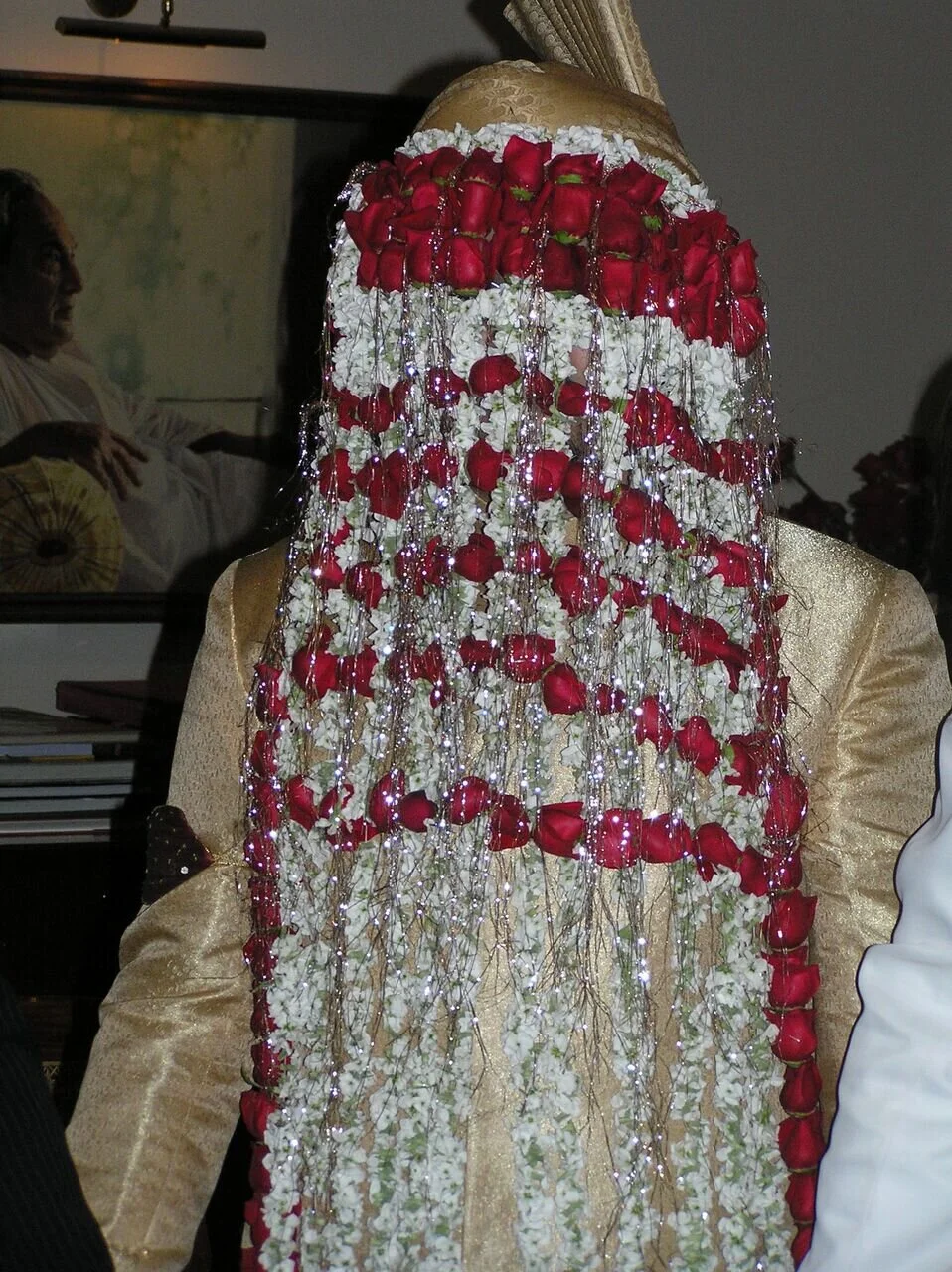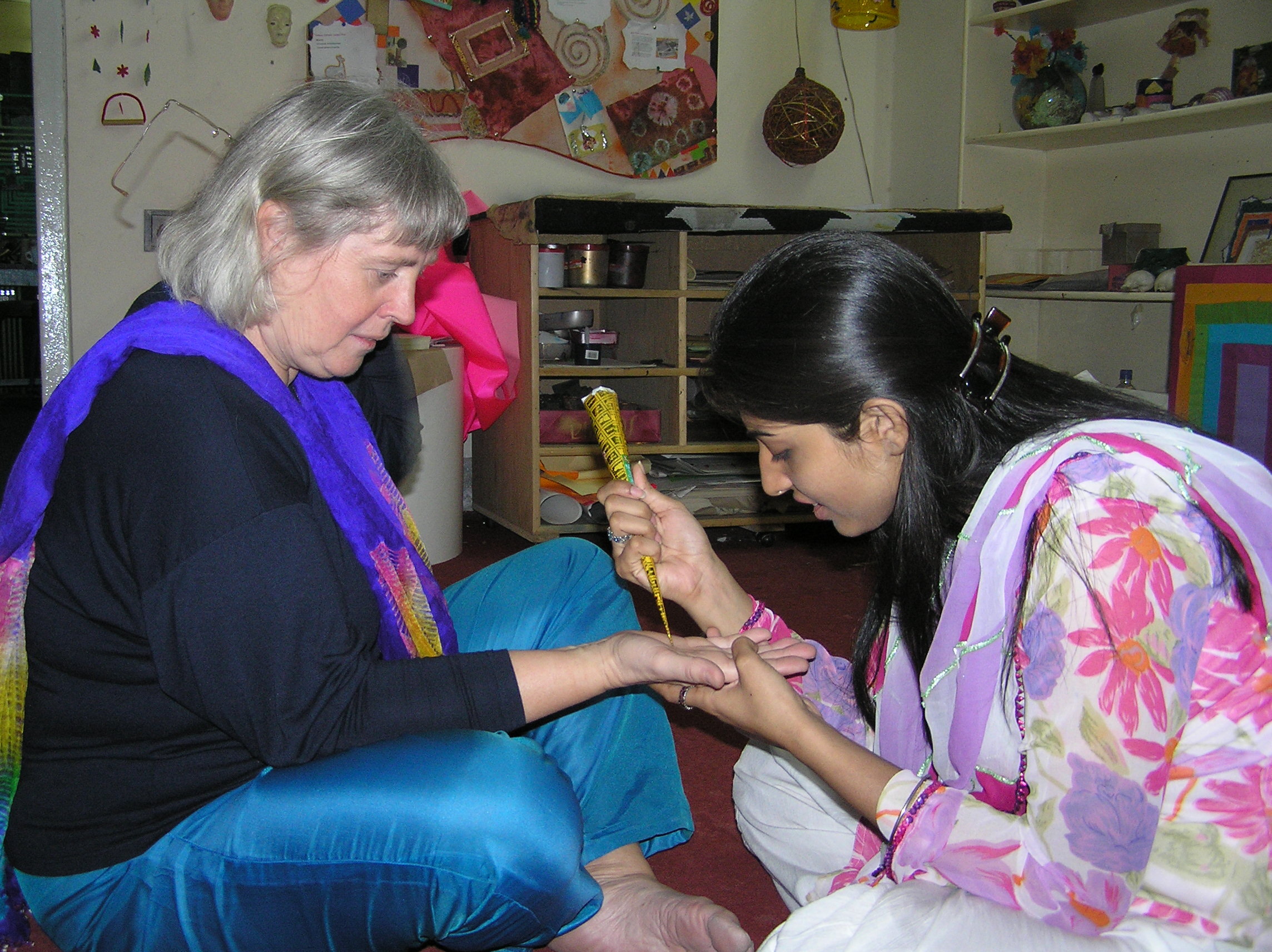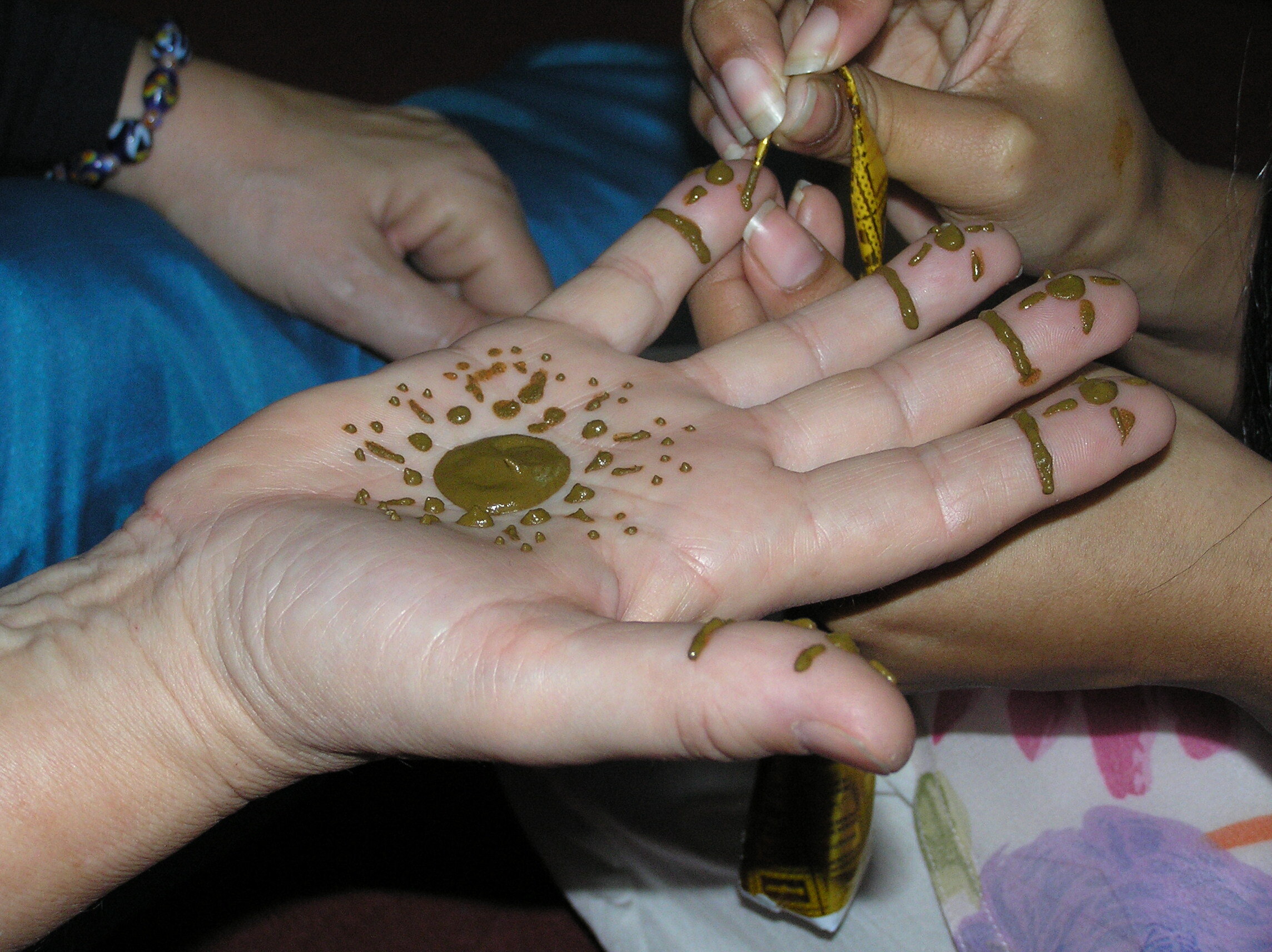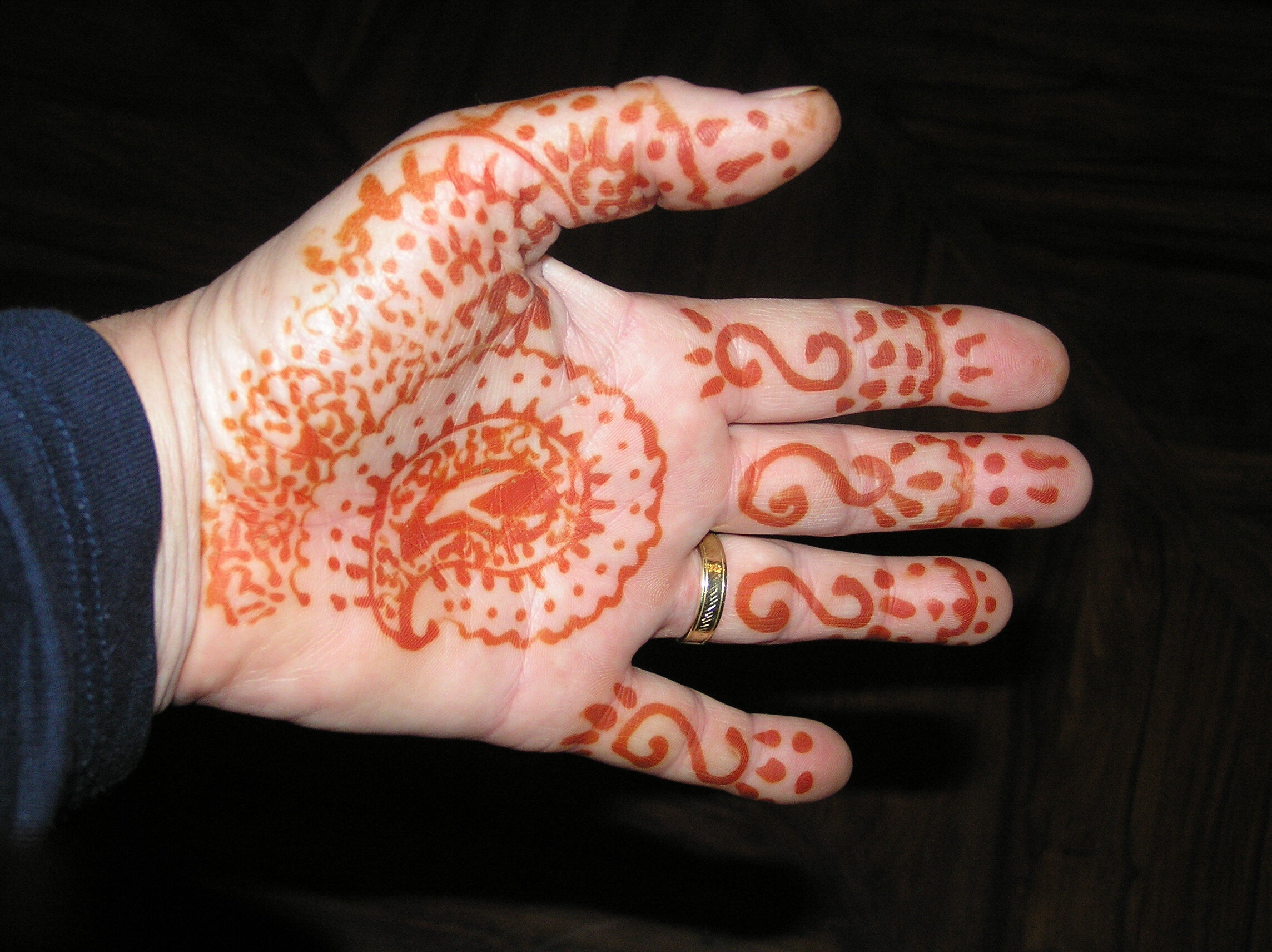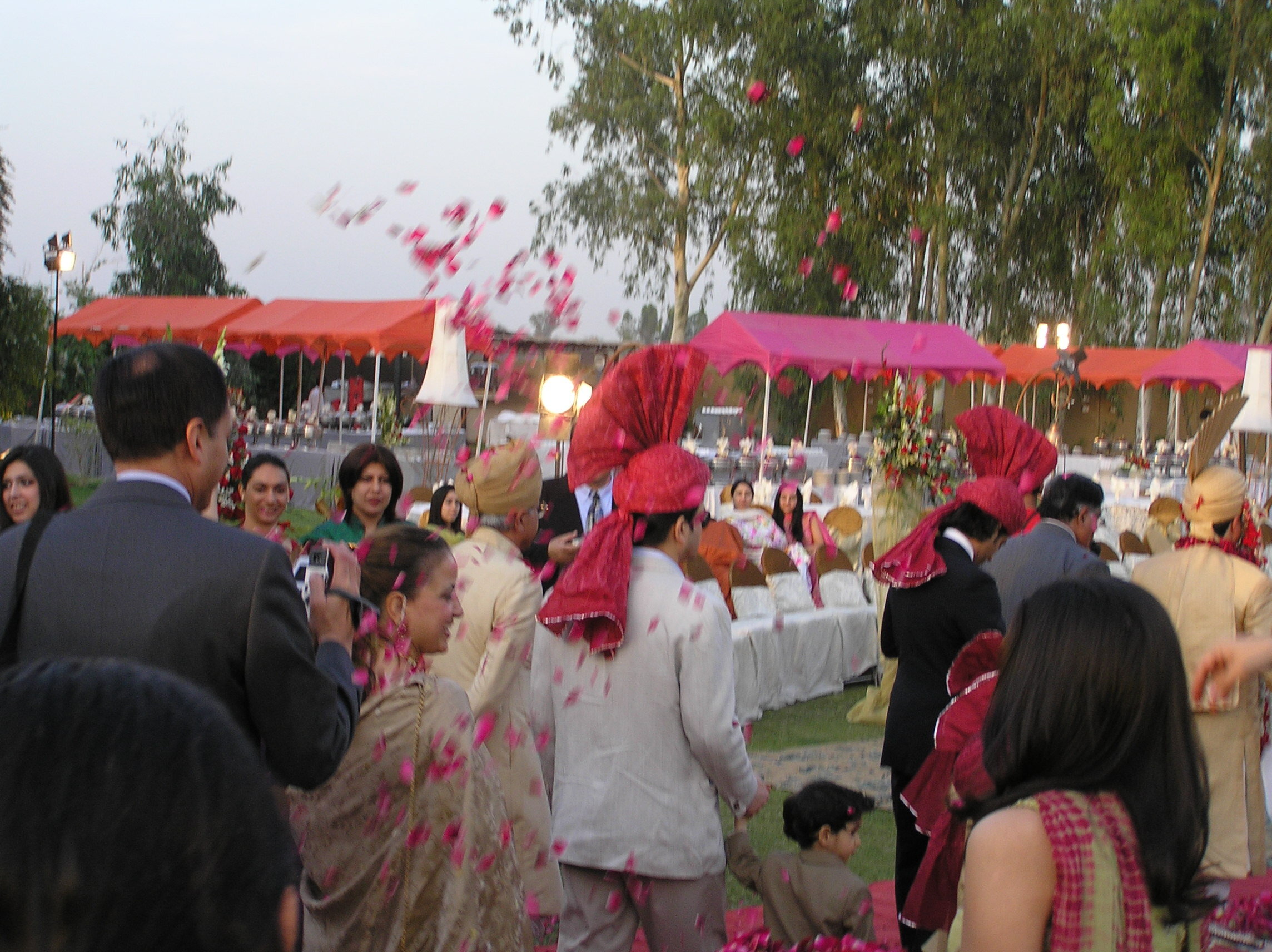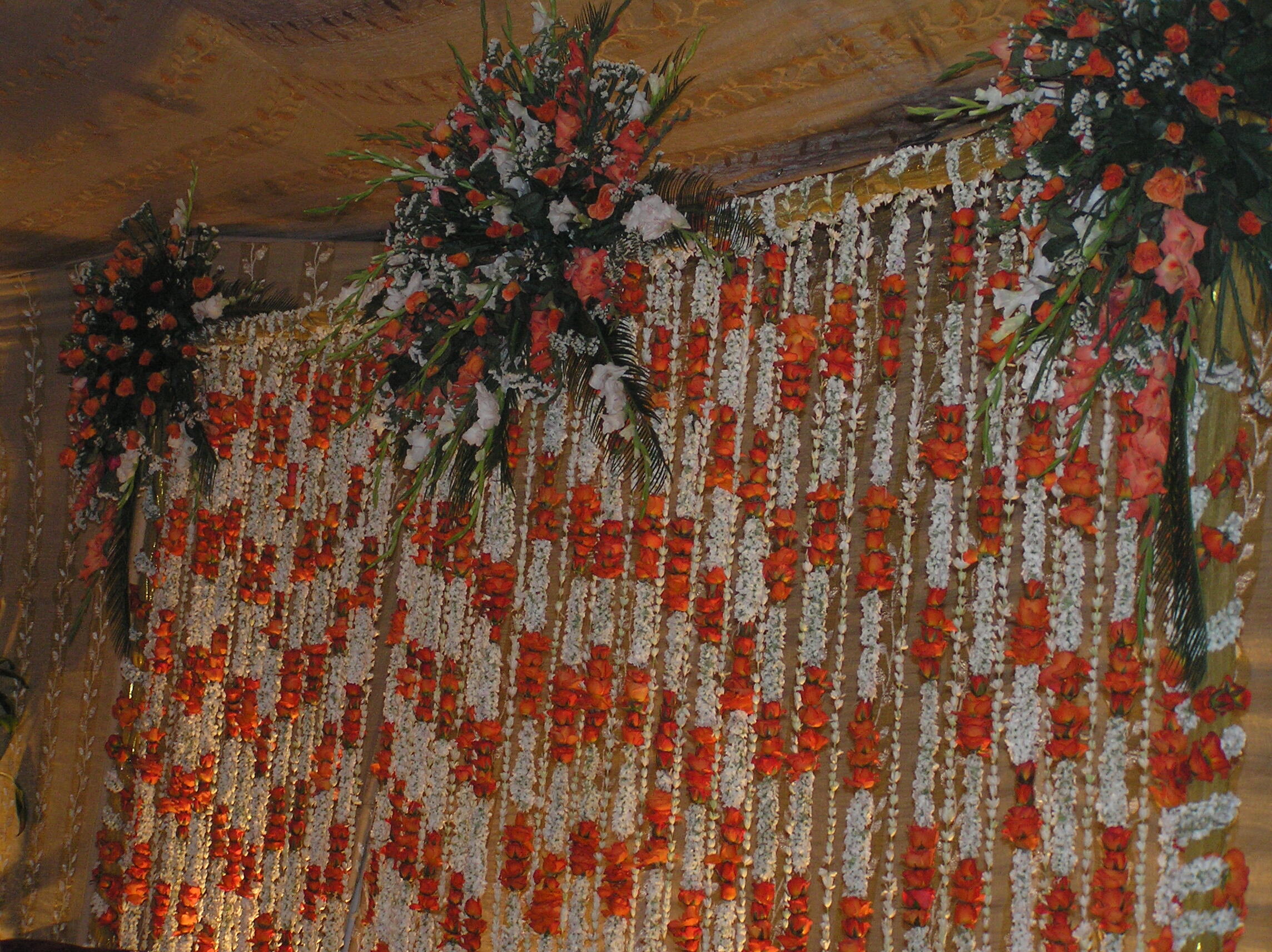Bride and Groom in Pakistan
A wedding in Pakistan, I learned, is celebrated on five consecutive days. I also found out that I am incredibly lucky: my visit to Pakistan coincides with a cousin's wedding and I am to join them as family for the traditional celebrations. My first night here is the formal asking for a blessing of Allah, praising and thanksgiving. I already have two gorgeous outfits, a green satin pair of very baggy pants with a long striped top and a bright blue set - the set is called shalwar kameez.
There are several official parts to the wedding celebrations:
1] Qawali. This first one is the blessing/thanksgiving.
2] Mehndi. A festive, colorful get together where candles are lit in special ‘mehndi’ painted pots and bangles are given away to guests.
3] Sehra Bandi I Barat. This is the official signing of the marriage agreement and most formal part of the wedding.
4] Valima. A festive get together to dance, sing and celebrate.
At the groom's home we are welcomed. I ask if I’m allowed to take photos and if they will let me know when it is not appropriate. “Honey, you are part of the family now,” I am assured, “it is fine.” I wonder regularly if we treat foreign visitors as kind and hospitable as I am treated here.
When the ceremony starts, we cover our heads with shawls and one of the elder women chants a long prayer from the Koran. Incense burns and we’re all given jasmine scent paper flowers from a basket. Musicians play a small drum and clay pot until it’s time to eat. Tables groan under the weight of many dishes: rice with beef, curries, salads, corn, Nan bread and a flat bread called roti, yogurt, and much else. A separate table holds cakes, chocolate things, sweet noodles, etc. No alcohol in this Muslim nation - just small glass bottles of coke and orange pop.
The following day, at the offices of Alif Laila, the library project my friend runs, the girls call me into a room and tell me it’s time for mehndi. I had no idea what that was... They bring out tubes of henna and, all seated on the floor, decorate the insides of my hands for the wedding. All women at a wedding ‘do’ henna. It is a big deal here. They all get together and decorate each others hands.
Henna is an ancient tradition, a paste made from leaves of the henna tree. It comes in a pointy tube. They cut the point off and apply it to my hands in intricate designs. It sits on the hand as a dark brown paste. Then it has to dry for an hour so you can't do anything... just waves your hands in the air to dry and make small talk. We laugh and chat, I guess a lot like western girls have ‘their nails done’…
After an hour I scratch off the dried muck and, voilá, the design is on my hands in a bright orange. This gets darker as time goes by and will eventually wear off after about a week.
After the henna party, we went home to change, to dress up, and then leave again for that day’s wedding celebration. At home my idea of dressing up is a clean pair of jeans. Here I have a bright blue silk outfit with dainty shoes, new jewelry and a white shawl with seashells on it. It’s fun to dress up for a change.
It’s snowing rose petals…
The women of the family are all much more glorious than I, dressed gorgeously in silks and shawls with sparkling jewelry. They have their hair braided with dangles with mirrors in it. When we arrive at the groom's parents’ home, the entire driveway is lined with rose petals and candles. In the living room we all find a spot to sit on colourful silk pillows on the floor or on low benches along the walls. Tonight there are mostly women but also a few men. Two musicians sit on the carpet and play music on a large stone pot and round drums. People sing songs, typical Oriental singsongy chants. We all clap along. Sometimes somebody gets up and dances, arms swaying in the air. People drop money in the circle on the floor. Every time someone gets up they urge others for more money and to dance more elaborately.
I assumed the money was a gift to the bride and groom but, when I asked, I am told that it will be given to the poor.
On one couch, a sulky teenager sits, playing games on his cell phone without looking up at the age-old, traditional scene in front of him. Finally I whisper to him, “Do you know what are are missing?!” He looks up, surprised. I don’t have enough eyes to take it all in while he takes his culture for granted…
After an hour or so of singing songs, we all get up to go outside into the huge garden. Long tables line the back of the house, under palms trees, and laden with food. There’s meat being roasted and bread being baked on fires. We load up plates with rice, baked fish, lentils, potatoes, all sorts of concoctions that I don’t know but want to try them all. As we eat I realize that families here visit and gossip just like people everywhere.
The next evening we leave the house late at night. When we arrive, all dressed up in different outfits, I thought we were at a fancy hotel. But I soon realize the house is enormous with an huge tent sent up in the garden, made of beautiful cloth with gold print. It has a large carpeted sitting area with colourful pillows tossed about. There are also rows and rows of comfortable chairs, all draped with white cloths and tied with ribbons and bows. There’s a 'stage' platform on which a man and (blind) woman sing lovely songs. The backdrop for the stage consists of a long bamboo pole hung horizontally and draped with long straight garlands of fresh flowers: small white flowers and soft orange roses. (roses are very inexpensive here: I bought my friend 5 DOZEN fresh red roses from a street vendor for $1.25!).
A rose curtain…, not ‘the curtain rose’…
Some young men gave a lovely concert on guitars and the traditional sitar, a medley of Arabian music crossed with Spanish guitar. Very nice.
After an hour of sitting and listening to the singing, we all got up and lined up at long tables with food again. Good thing my shalwar kameez is baggy! I sample squares of fried cheese, fish, lots of meat and lentil dishes, rice and more. Dessert consists of chocolate cake, strawberry puffs, and sweet noodles made from a flour paste, squeezed from a piping bag on to a hot surface into a thin long zigzag ribbon and slowly fried, turning a soft pink and very, very sweet.
Then we sit down for about four hours of listening to very traditional singing. I think this was called the Qawali. A group of about 12 men in sober brown tunics sat cross legged on the stage (for some 4 hours without getting up!!). Two lead men wearing small brown caps on their head, sang and played the harmonium. The songs they did were apparently thousands of years old, folk songs which really sounded nice. Very happy, slow, chant like. The men formed the back ground choir and clapped hands while sitting very straight and without resting their elbows. I marvelled at how they could hold this position for so long without squirming. The crowd kept nodding or shaking heads, sometimes moving their hands. I had no idea what the songs were about - they are in Urdu, Persian and all sorts of other ancient languages and dialects. Fascinating.
At some point baskets of candy were passed around, and also paper points looking like little ice cream cones. I thought they were melting because they were all sticky and runny. Inside the paper was leaf (of the betel tree) with betel nuts soaked with rose water and other flavours. I licked it and tasted it but didn't eat it. It's interesting, but good, not to see any alcohol at parties like these. But having no alcohol may well have saved the country.
These wedding parties I am fortunate enough to experience during my visit to Pakistan, are not so much "just parties" to celebrate a wedding - they are all integral parts of the wedding ceremony. There was the thanksgiving, the menhdi, then the traditional singing evening. Tonight is a formal festival of song and dance. It also seemed to be the occasion for the most formal outfits. Tonight’s formal attire dates back to Moghul times. Many of the ladies wear headpieces with an ornament on the forehead, reminding me of Sheherazade. And indeed I keep pinching myself, feeling like I have landed in a tale from 1001 Arabian Nights.
Pakistani people are so gorgeous…
On the bus, on the way to the home of the bride’s parents, the ladies sang. The groom's sister was one of the most ornately dressed women there, all in gold and glitter. Very, very beautiful. I commented on how gorgeous she looked and she grinned "Oh, my husband says I look like a Christmas tree.”
For the first time, tonight I noticed a few other westerners; a young girl from Germany who teaches at an inner city school in Lahore as volunteer, and some people from England. They all had the same experience as I have: they had been warned against going to Pakistan, yet they all marvelled at how safe and wonderful it really is. Most blame the media.
An older lady introduced herself to me. She and her doctor husband spent some years abroad. Now they had chosen to move back to Pakistan. She said "It is too bad there is such a difference between rich and poor." I agree, especially tonight with all the richness and glitter, that difference is very obvious when we pass people working along the streets. "It is a vicious circle," the lady sighed, "the rich have fewer children, who get a good education and find good work."
However, at the same time the well-to-do seem to do a lot more here than they do elsewhere to bridge that cap. My friend runs a library program full time and gives every day to the poor. This lady mentioned that her husband runs a clinic free of charge and she runs an orphanage. Most of the rich seem to do things like that - working full time in community service work. The rich also employ people, providing shelter, food and children's education. Despite the poverty I have not seen people living on the street. "People live with their families," I am told when I ask about the homeless.
I also learned fascinating things about marriages from her. It has not been long since couples can choose their own partners. Before this all marriages were arranged. Now about 65% of marriages are still arranged (not this one). She said it’s changing because of women getting good educations and becoming more vocal and assertive. Her own was an arranged marriage as were most. She added that Pakistani's are much more involved with their families and friends than westerners are. "We know exactly what our friends feel like and think about. So if there are problems (for instance between husband and wife) we ask and coax and tell our friends everything. Thus we can work out our feelings and always lean on family. That way there are not many divorces, although they do happen.”
When she lived abroad, she said, her neighbours encouraged her to put up a sign with 'room for rent'. She said that this whole idea was impossible because in Pakistan one would never ever charge a guest in your own house.
At tonight’s celebrations there are baskets filled with bangles for all the women, carried in by the women of the family while everyone chants and sings. We all file into a tent through an archway decorated with flowers. The groom's family was waiting and hung flower garlands around our necks. On a stage, decorated with flowers, a large couch awaited the bride and groom. As soon as we got to the main area, the dancing started. The women danced folk dances in a circle, typical Arabian dances, waving their arms and slowly turning in and out.
The groom was escorted to the couch under a canopy, by his friends all wearing long tunics and long yellow shawls. The bride was escorted by her family, also under a canopy and with candles.
They both sat on the couch for the rest of the night while all their relatives came up on the stage and did three things: they applied a small dab of henna on either the girl or the boy's hand (depending who was their relative), put some sugarcoated anise seeds on their tongue and waved money bills around their heads, then dropped them by their feet. This was all to bless them and to ward off bad spirits. Again, all the money is for charity and must be quite a bit by now. Imagine if all cultures did this and shared so generously with others.
The groom wore a heavy mask of roses.
For the most official marriage ceremony the men closest to the groom all wore red turbans with fancy combs on top. The groom's father was in full moghul costume - narrow tights and a long waistcoat. The groom himself wore a heavy curtain of white flowers and red roses fully covering his face. He couldn't see a thing nor, I assumed, do much breathing… The groom sat on a couch with this heavy screen in front of his face. People came and went. Suddenly I noticed that the groom was signing papers. Leila explained that the groom and bride were each asked three questions, while in separate locations. If they said 'yes' they signed papers to seal the marriage agreement. Once the bride had signed, friends would come out of the house, carrying baskets with small red and gold pouches which held nuts and candies. That was the sign that both said yes, signed and were now married. No announcement was made, no speeches at all. I asked why they were not together and was told that this way, if one of them wanted out when asked the questions, they would feel free to say no. Makes sense, especially since marriages so often were arranged.
So once we had our little bags of nuts, the bride was escorted outside and the parents gave their children to each other. No clapping or cheering. Just once that was done, relatives started kissing and congratulating each other. I feel so privileged to have witnessed and experience these events.
In addition to feeding many, many wedding guests, I noticed that all the drivers and servants, the nannies and all other support n, are equally fed. An enormous generator sat next to the house to support all of the extra lighting for the party. The power goes off regularly, sometimes three times a day. Weddings like this are an enormous event that must have been long in the planning.
On my very last day in Lahore we left early for the Grammar School - a nice 5 story brick building with open sitting areas on the roof and potted palms everywhere. I did two slideshow presentations for two groups of students and then a writing workshop with teachers from different schools. There was a tremendous wind storm, with sand and leaves blowing in under the door. The power went off several times.
Trucks in Pakistan are beautifully decorated.
That night, I was sad to say goodbye to everyone. Leila and her husband brought me to the airport, which wasn't very far. The airport was a gorgeous, new building with very tall arched windows and shiny marble floors, very very clean. Security, immigration, customs and then to the check-in counter for my boarding pass. I walked toward the gate and would have a few hours to wait for my 3 AM flight. Immediately, a man from a coffee shop came and asked if I wanted tea or coffee. First I waved him away and did some window shopping. But once I sat down another man asked, so I said 'sure, coffee'. Well... they should have this service at every airport!! The man returned a bit later with a tray lovely laid out with a cup of strong coffee, milk, sugar, two slices or pound cake and some cheese sandwiches. I sat and enjoyed all this - for around two dollars!
When I first arrived in Pakistan, a man looked me in the eyes and said, “Your American friends probably told you not to come here.” Then he smiled and said, “Go back and tell them that we hate extremists more than they do.” And so that’s what I did.
What a privilege it has been to learn more from my Muslim friends about their culture and customs. It's been an incredible trip and I have learned so much. This experience will stay with me forever. I am so grateful to be a writer of books that lead me on this adventure. Our world can truly be a better place, full of new friends - if we are willing to meet them, by following new paths as well as our heart.
Click BOOKS and scroll down to Pakistan for recommended titles.
